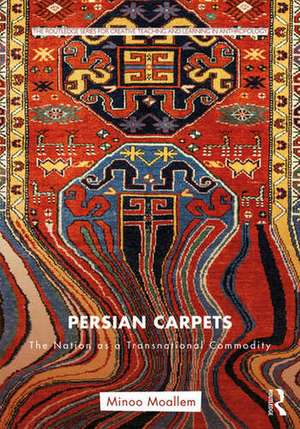Persian Carpets: The Nation as a Transnational Commodity: Routledge Series for Creative Teaching and Learning in Anthropology
Autor Minoo Moallemen Limba Engleză Paperback – 30 mai 2018
Bringing transnational feminist cultural studies, ethnography, and network studies within the same frame of reference, this book sheds light on Orientalia as civilizational objects that emerged as commodities in the encounter between the West and the many directly or indirectly colonized Middle Eastern and West Asian cultures, focusing on the specific example of Persian carpets as some of the most extensively valued and traded objects since colonial modernity.
Toate formatele și edițiile
| Toate formatele și edițiile | Preț | Express |
|---|---|---|
| Paperback (1) | 350.72 lei 6-8 săpt. | |
| Taylor & Francis – 30 mai 2018 | 350.72 lei 6-8 săpt. | |
| Hardback (1) | 764.20 lei 6-8 săpt. | |
| Taylor & Francis – 16 mai 2018 | 764.20 lei 6-8 săpt. |
Preț: 350.72 lei
Nou
Puncte Express: 526
Preț estimativ în valută:
67.11€ • 70.57$ • 55.45£
67.11€ • 70.57$ • 55.45£
Carte tipărită la comandă
Livrare economică 16-30 aprilie
Preluare comenzi: 021 569.72.76
Specificații
ISBN-13: 9781138290259
ISBN-10: 1138290254
Pagini: 160
Ilustrații: 34 Halftones, black and white; 34 Illustrations, black and white
Dimensiuni: 178 x 254 x 13 mm
Greutate: 0.32 kg
Ediția:1
Editura: Taylor & Francis
Colecția Routledge
Seria Routledge Series for Creative Teaching and Learning in Anthropology
Locul publicării:Oxford, United Kingdom
ISBN-10: 1138290254
Pagini: 160
Ilustrații: 34 Halftones, black and white; 34 Illustrations, black and white
Dimensiuni: 178 x 254 x 13 mm
Greutate: 0.32 kg
Ediția:1
Editura: Taylor & Francis
Colecția Routledge
Seria Routledge Series for Creative Teaching and Learning in Anthropology
Locul publicării:Oxford, United Kingdom
Public țintă
UndergraduateCuprins
Series Foreward; Introduction; Chapter 1. Objects of Knowledge, Subjects of Consumption; Chapter 2. Transnational Orientalia and Civilizational Commodities; Chapter 3. The Spectacle of Labor; Chapter 4. Nation As A Commodity; Chapter 5. Between Carpets and Computers; Epilogue
Notă biografică
Minoo Moallem is Professor of Gender and Women’s Studies at the University of California at Berkeley.
Recenzii
"Moallem’s astute analysis and the fascinating range of material with which she engages is indeed a creative and effective way to familiarize students with theoretical and methodological concepts in anthropology, cultural studies, political economy, and transnational feminist theory."
--Sima Shakhsari, Jadaliyya
--Sima Shakhsari, Jadaliyya
Descriere
Persian Carpets: the Nation As a Transnational Commodity tracks the Persian carpet as an exotic and mythological object, as a commodity, and as an image from mid-nineteenth-century England to contemporary Iran and the Iranian diaspora. Following the journey of this single object, the book brings issues of labor into conversation with the politics of aesthetics. It focuses on the carpet as a commodity which crosses the boundaries of private and public, religious and secular, culture and economy, modern and traditional, home and diaspora, and art and commodity to tell the story of transnational interconnectivity.
Bringing transnational feminist cultural studies, ethnography, and network studies within the same frame of reference, this book sheds light on Orientalia as civilizational objects that emerged as commodities in the encounter between the West and the many directly or indirectly colonized Middle Eastern and West Asian cultures, focusing on the specific example of Persian carpets as some of the most extensively valued and traded objects since colonial modernity.
Bringing transnational feminist cultural studies, ethnography, and network studies within the same frame of reference, this book sheds light on Orientalia as civilizational objects that emerged as commodities in the encounter between the West and the many directly or indirectly colonized Middle Eastern and West Asian cultures, focusing on the specific example of Persian carpets as some of the most extensively valued and traded objects since colonial modernity.












